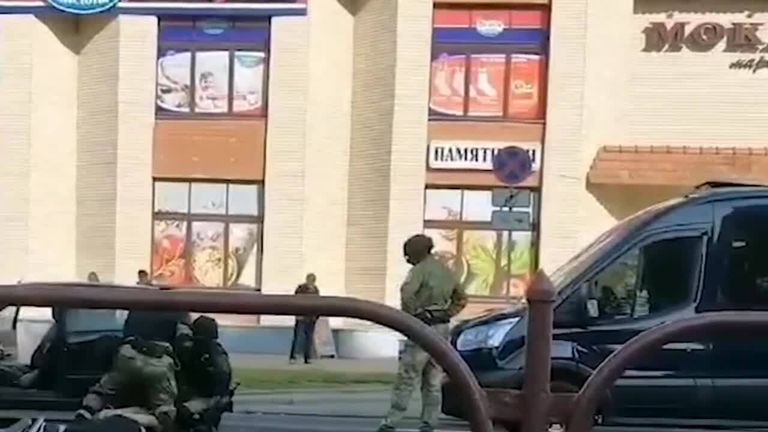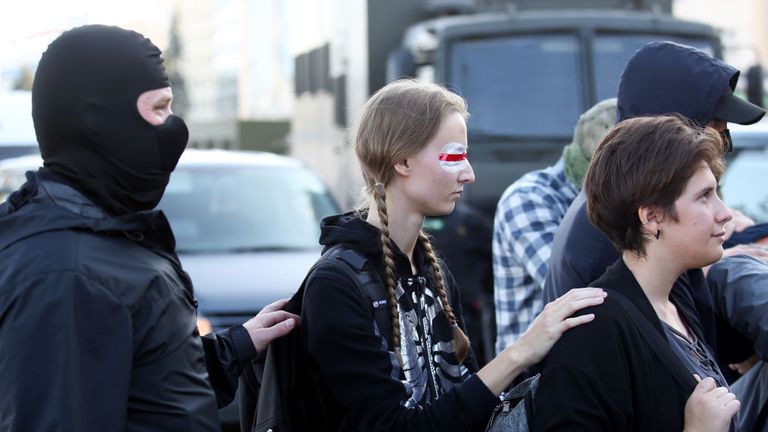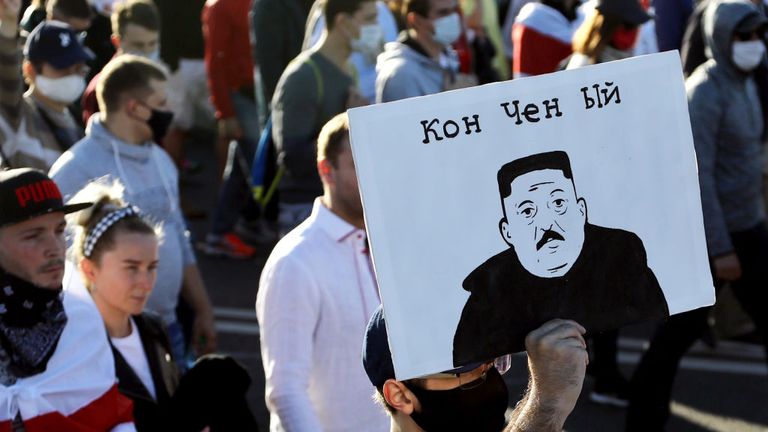Tens of thousands of people marched through the Belarusian capital Minsk on Sunday, calling for the resignation of president Alexander Lukashenko in the sixth straight weekend of protests.
It comes as hackers leaked the personal details of more than 2,000 senior police officers in two batches, pledging that “no one will remain anonymous, even under a balaclava”, amid reports of violent crackdowns targeting demonstrators.
At least 10 people were detained on Sunday, according to the Russian news agency TASS, which quoted a police spokesperson. Human rights group Spring-96 said at least 196 people were detained across the whole of the county.
Local media organisations shared videos showing the security forces wearing helmets and balaclavas dragging demonstrators off the streets.
On Saturday, more than 390 women demonstrating in Minsk were arrested, including an elderly woman who has become a symbol of the protests.
The unrest began following the 9 August presidential election which many Belarusians believe Mr Lukashenko, a former Soviet collective farm manager, fraudulently won.
Mr Lukashenko has been president of Belarus for 26 years, during which time he has consistently suppressed political opposition.
He has resisted calls to resign, sometimes appearing carrying an automatic rifle, and buoyed by support from the Russian president Vladimir Putin.
Weeks ago, the European Union vowed to impose sanctions on Minsk for alleged election fraud and human rights abuses, but it is now expected to miss its Monday deadline for action.
Thousands of people have been detained during the protests, many of whom have reported being beaten and tortured while detained – although the government denies these claims.
“As the arrests continue, we will continue to publish data on a massive scale,” the hackers told opposition news channel Nexta.
The details include the names of the senior officers, as well their surnames, patronyms – common in Russian-speaking countries – as well as their dates of birth, parent units, ranks and positions.
A second batch of more than 1,000 names was released on Sunday evening, this time naming officers in the western Belarusian city of Brest where the leakers claimed the policer were particularly heavy-handed.
The government said it would find and punish whoever was responsible for leaking the data on police officers, which was distributed over the popular chat app Telegram on Saturday.
“The forces, means and technologies at the disposal of the internal affairs bodies make it possible to identify and prosecute the overwhelming majority of those guilty of leaking personal data on the internet,” said Olga Chemodanova, a spokesperson for the Belarusian minister of internal affairs.
Opposition leader Svetlana Tikhanovskaya praised the women’s march in a video statement from Lithuania, where she fled after being held inside a government electoral office following the election.
Speaking to Sky News, Mrs Tikhanovskaya said she was not yet ready to talk about what happened to her during the time she was held in custody.
It is thought she was threatened with being separated from her two young children, whom she had already moved to Lithuania.
“They have frightened and put pressure on women for the second month, but despite this, Belarusians are continuing their peaceful protest and showing their amazing fortitude,” Mrs Tikhanovskaya said of Saturday’s march.
The Belarusian government reacted angrily to reports that Mrs Tikhanovskaya could soon meet EU foreign ministers.
Foreign ministry spokeswoman Maria Zakharova criticised the EU, accusing Brussels of attempting to “rock the boat” in Belarus – seen by Moscow as a strategic buffer against the EU and NATO.
Russia has accused the US of fomenting revolution in Minsk, and agreed to give a $1.5bn (£1.16bn) loan to prop up Mr Lukashenko’s government following a meeting with Mr Putin.
Belarus will spend $330m (£255m) of the money it has received to cover its outstanding debt to the Russian gas giant Gazprom, according to Russian finance minister Anton Siluanov.




